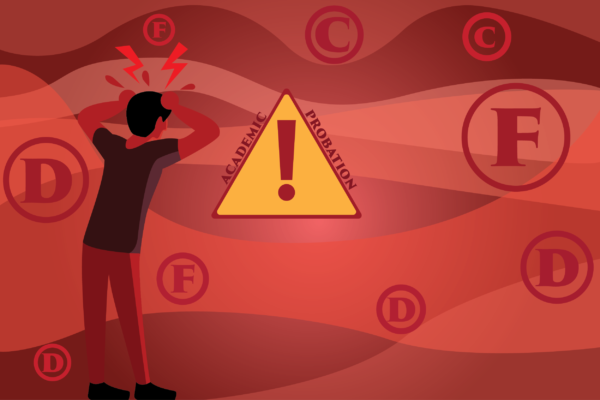Academic probation isn’t a death sentence
April 13, 2020

By JORDAN LACKEY
@TheEtCetera
The world of academic probation isn’t made up of hardened criminals, but for many students the verdict feels like a prison. For them, academic redemption is a light on the horizon well within sight, yet so far out of reach.
In order for a student to be put on academic probation, their grade point average must drop below a 2.0. This puts a student on probation level one. After that, if the student does not maintain Cs in all their courses, they can be suspended for the next 16-week semester. Upon returning from suspension the student is then placed on probation level two and only allowed to enroll in a maximum of six credit hours. Once on level two, the student is still expected to maintain all Cs and they must enroll in a human development course, or HDEV 0100. If a student is unable to meet these requirements, then they can be dismissed for an entire year. If the student is still unable to raise their GPA after coming back from their second suspension, then there are grounds for indefinite dismissal.
LeAnn Akins remembers the way she felt after being dismissed from the University of Colorado in 1990.
“It was excruciating,” said Akins. “I felt like a huge disappointment.”
After high school she was completely unprepared for a four-year university. Akins said there were plenty of reasons for her academic demise that year. Between distractions with friends, time management issues and trouble comprehending classroom material, she felt overwhelmed.
“It just snowballed and then turned into an absolute avalanche at the end of the year with my ultimate dismissal,” she said.
Akins said she went through a severe low point when she was asked to leave after her second semester without the option of returning. With a zero GPA, she felt like she’d wasted a year and doubted her own ability to succeed in her education. She felt alone because she didn’t see any of her friends having these problems. She even lost her tennis scholarship.
[READ MORE: Arrested development: Academic probation hits students hard]
After that, she decided it would be best to get away from her hometown so she could focus on her education without distractions. She enrolled at Foothill Community College in Los Altos Hills, California, and began trying to rebuild her GPA.
Akins said she didn’t learn how to ask for help until then. She noticed it seemed like everyone she knew was too preoccupied with pretending like they knew what they were doing. She wanted to actually try and figure it out. She started taking advice from professors and advisers. She would ask for recommendations from professors who didn’t even teach her classes. She was surprised to learn that many of the faculty members talked with each other and sometimes just having another teacher in her corner could help her reach the resolutions she needed.
Now, as a senior academic adviser, Akins encourages students to take advantage of the tools that are at their disposal. She said academic awareness is crucial, but even more importantly, students should connect with staff and faculty because they’re here to help.
“That’s what I’m here to do,” said Senior Academic Advisor Laconna Looney-Evans. “To see you through the good, the bad and the ugly.”
Looney-Evens is a member of the team that helps set the guidelines for the academic probation process. She’s also directly involved with the students going through the ordeal. She said the stigma attached to students on academic probation isn’t true. This can happen to anyone, and it’s not a reflection of work ethic or intelligence. She said life just gets in the way sometimes.
“Being on probation is not the end-all,” Looney-Evens said. “Sometimes, a little detour will help you really figure out who you truly are meant to be.”
There are always options for students, and the advising staff wants to make that clear. If a student is dismissed due to their GPA, they may not be allowed to re-enroll in academic courses for up to one year depending on their probation level. However, Eastfield’s trade or skill-based programs are totally unaffected by academic probation. If a student is suspended because of their grades, they are encouraged to pursue other options such as phlebotomy or even brewing until they can register for classes again. Looney-Evans said this can be a good way for a student to regain their focus and make the best out of a bad situation.
Ideally, advisers would prefer to prevent this from happening in the first place. Senior Academic Adviser Lanita Etea said it’s paramount that students stay connected and reach out before things get too bad.
“The easiest thing a student can do is to check their email,” she said.
Advisers will reach out to students at the first sign of trouble any way they can. Some courses even have a built-in alert system for professors to use in Blackboard to notify advisers when a student isn’t doing well.
[READ MORE: Campus coronavirus updates: Student services]
Email is the first line of defense when trying to combat academic decline. For more extreme cases, advisers will go to a student’s classroom and pull them out to talk.
“For students who are on probation, we will not shame them. We will not judge them. And we will not discriminate,” Etea said.
Advisers know that sometimes students can be intimidated by the idea of talking with them. They want to remove that stigma and encourage all students to seek advice so they can have a better academic foothold.
“When you come to see me, I don’t have a Darth Vader mask on. You’re not in trouble,” Akins said.
Jessica Ontiberos knows exactly what it can be like to stare academic frustration in the face. She first enrolled in classes in 2013, around the same time she was fighting for sobriety. She said she made some mistakes and things didn’t work out that year. She didn’t go to class and she didn’t drop her courses. She just stopped showing up.
[READ MORE: OPINION: Addiction is not a weakness, it’s a disease]
Five years later, with a new and sober outlook on life, she attempted to re-enroll. This is when ghosts from the past came back to haunt her. She was told she’d immediately be put on academic probation due to her zero GPA from 2013 and she was not eligible for financial aid. Some of the classes she took back then aren’t even in the current curriculum, so she had no hope of retaking them to balance her GPA.
Ontiberos had fought through a lot to get back into school. She wanted to help people, and she felt like she was being shot down before she even got started. But she refused to be discouraged.
“I wasn’t gonna walk,” she said. “I talked to a couple advisers, and [they said,] ‘You’re not doing this for yourself. You’re doing this for other people, to let them know that it’s possible.’”
Ontiberos said she worked hard to pull herself back up, but she did it with a lot of help from advisers and faculty members. Executive Vice President, Mike Walker, even personally intervened to make sure a large chunk of her tuition would be covered by the college due to her high grades upon returning to school.
Now, Ontiberos is set to graduate from Eastfield in May with an Associate of Arts degree and she’s been accepted into the University of Texas at Arlington’s Bachelor of Social Work program.
“I’m the one that has control of my destiny,” she said. “Not the system.”
https://eastfieldnews.com/2020/04/08/our-pandemic-story-no-boredom-for-pharmacy-technician-student-staff-writer/



